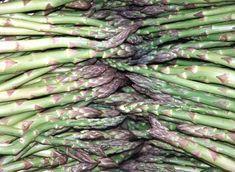
Being heavily reliant on imports from places as far afield as Peru, Senegal and Mexico for the biggest part of the year, consumers always look forward to the English asparagus season getting underway.
This year, however, the season hasn’t got off to the best start. Heavy rainfalls and cold temperatures have delayed the harvest, with mainly protected crops being ready for cutting in the last few weeks.
It is rather disappointing for those growers who were hoping for a repeat of last year’s early start to the main season, which resulted in 3,429 tonnes of asparagus being sold, an increase of 13 per cent over the previous year.
“It’s clear that it’s going to be a later season this year but it’s too early to predict volume figures,” says Andy Allen, chairman of the Asparagus Growers’ Association.
“It depends on the weather throughout the season. If we get slightly warmer temperatures it should pick up. I think we should be cutting by next week,” he adds.
Allen doesn’t think too many growers are looking to follow in the Chinn family’s footsteps by extending the season so dramatically, an approach that polarises views. “The premium has already been eroded by more people getting into polythene,” he says.
Chris Chinn of Cobrey Farms is aware that the eyes of the English asparagus world are on his company. “Clearly we have to be cautious. There are a lot of people putting asparagus in the ground, but demand is strong at the moment and the market is in growth,” he says.
It is a trend that he thinks will prevail. “Yes absolutely, the demand for British asparagus will continue to grow. The response from consumers has been great; it was a complete sell-out in M&S last year,” he says, adding that the Chinn family has made it their mission to try to reduce M&S’ need for imported asparagus. “As soon as the sun comes out we will start harvesting. We need temperatures of above 15 degrees to start off the harvest and then 11 degrees to sustain it.”
Cobrey Farms in Herefordshire dramatically extended the English asparagus season from what used to be a couple of months to a period lasting from February to June, and then a couple of months in September through to October. “I’d rather not talk about specific numbers,” says Chinn, “but I expect the volume will grow another 50 per cent compared to last year for the autumn crop.”
Lincolnshire-based farmer Nick Loweth, who runs the family business Abbey Parks, is also hoping for warmer weather so that he can start harvesting. “We’ve been cutting under glass for about a month, but not out in the fields,” he says. “If it’s a cold, wet May as forecasted I don’t think we’ll get two tonnes to an acre, which is roughly what we got last year, but demand is outstripping supply at the moment and we’re selling asparagus for £10 a kilo.”
Of course, with the unpredictable UK climate it is unlikely that there will ever be cost-effective home-grown asparagus on retailers’ shelves 12 months of the year, according to Jamie Petchell, commercial director of Hargreaves Plants. However, he thinks there is still a long way to go in terms of further extending the English season.
“The area of asparagus grown in the UK is now double what it was 10 years ago. Even with this increase, we are seeing imported product during the main UK season. This is a result of significantly increased demand brought about by PR activity, as well as better growing and improved marketing of the product,” he says.
Hargreaves Plants has released a number of improved varieties in the past eight years. The two most successful to date have been Mondeo, an early main season type, and Guelph Millennium, a later cropping cultivar, which together have stretched the shoulders of the main UK season, and Petchell predicts we will see further season extension in future.
In the foodservice arena, Fresh Direct has partnered with growers under the FreshGro brand to ensure it can supply top-quality asparagus and other products.
Fresh Direct has British asparagus available from mid-April to early June, and points out that its approach allows zero waste as even odd-sized spears can be used within The Kitchen, its initiative that creates a wide range of prepared fruit and vegetable formats. -



